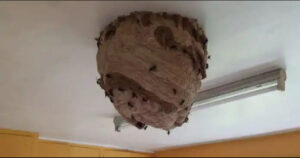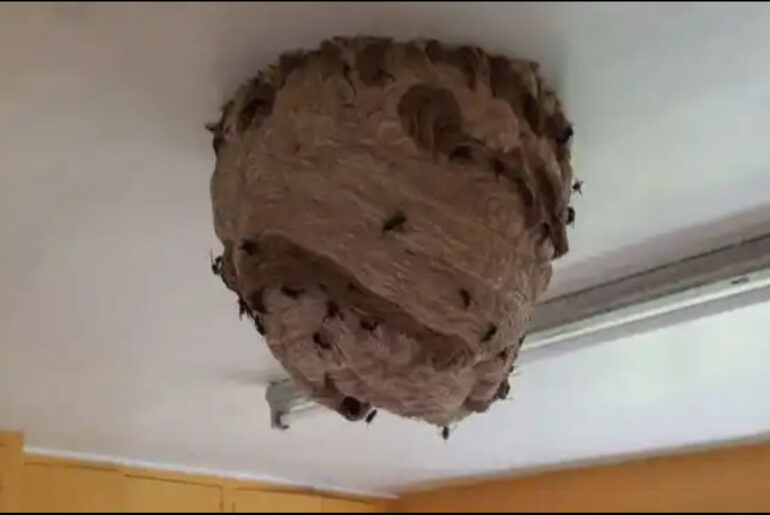Asian hornets, scientifically known as Vespa velutina nigrithorax, recently made their presence known at an abandoned house in St Brelades, a picturesque town nestled on the Channel Islands in the UK. Native to Southeast Asia, these hornets have earned notoriety for their invasive nature, posing a significant threat to local hornet populations and ecosystems, particularly bee colonies. In addition, Asian hornets can exhibit aggressive behavior towards humans, making their presence a concern
Asian hornets initially entered Europe through a nest that was hidden outside a ship. From the south of France, where they were originally discovered, they quickly spread to the rest of the continent, including the United Kingdom.

Due to its proximity to the European continent, the Channel Islands, especially St. Brelades, are especially sensitive to the presence of these hornets.
Compared to the 71 nests discovered at this time last year, the nest discovered in St. Brelades has brought the total number of Asian hornet nests in the UK to 171 this year.
Authorities fear they are losing the ability to keep the species out of the country.
People are being warned to take extra care if they come across an Asian hornet nest.
People should learn how to skillfully deal with such circumstances because these hornets spread quickly.
They are most often seen in:
houses and buildings
they nest in bushes and trees
Wherever they can find a warm place to hide in orchards in the winter.
There are several precautions you should take if you come across an Asian Hornet nest, as they can become very hostile if their habitat is disturbed.
Observation and reporting: Do not attempt to completely remove it yourself as it requires the necessary knowledge. You shouldn’t even bother them because they might attack you. Instead, notify the authorities in your area and give them your exact location. If you are based in the UK, you should contact the Animal and Plant Health Agency. They have the tools and resources needed to handle Asian hornets.
Keep your distance: Avoid getting too close to the nest as this could lead to an attack. Remember that this insect has quite a painful sting if it bites you.
Educate yourself: Learn more about these insects so you can be prepared if you encounter them.
Protect your property: If you know there is a nest near your home, take every precaution to keep the animals out of the building. Repair minor cracks and close windows and doors when not in use.
Consult a professional: If you encounter an Asian hornet nest, you should always contact a professional pest control agency. They are the ones who can solve the problem in the most efficient way.
By taking these precautions and seeking professional help when needed, we can help protect our local ecosystems and the well-being of our communities. Addressing the presence of Asian hornets is vital not only to protect biodiversity but also to ensure the safety and peace of mind of people living in areas affected by their presence.
In conclusion, it is imperative that we remain vigilant and educate ourselves about the potential risks posed by invasive species such as Asian hornets. By sharing knowledge and following safety guidelines, we can work together to manage and mitigate the impact of these hornets on our environment and society.
Please share this information with your family and friends to raise awareness and encourage responsible action in the face of this challenge.
SHARE this content on FACEBOOK with your loved ones.




